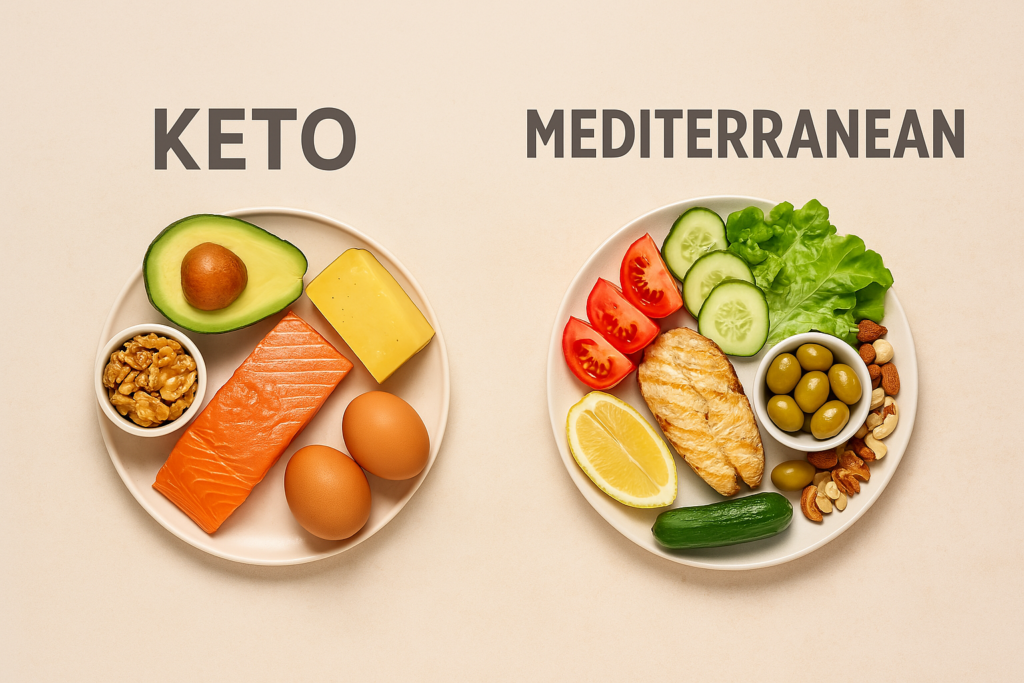
Keto vs. Mediterranean Diet: More people are also getting serious about their health in 2025. As the awareness of the aspects of weight management, chronic illness, and vitality elevate, the focus has been moving towards sustainable dietary consumption. The Keto and Mediterranean diets are two dieting styles that have attracted so much discussion even more in the era of wellness. Both are extolled in terms of their advantages, but have different applications. Knowledge of such differences will assist in your choice of better long-term outcome.
Foundations of Each Diet
Ketogenic diet also known as the Keto diet bases its application on high fat, moderate protein and very low levels of carbs. This combination propels the body into ketosis which is the condition where body fats are the principle source of energy rather than glucose. It is a technique associated with fat burning and the metabolic changes that it brings.
By contrast, the Mediterranean diet is all about balance. It entails vegetable, fruits, whole grain, dairy products, lean protein like eggs, fish, etc., and heart healthy fats like nuts, olive oil. It is based on the conventional dieting habits of Mediterranean nations and it is well established that it has beneficial health effects in the long term.
Recommended for Keto: MCT oil, Electrolyte Powder.
Recommended for Mediterranean: Organic Olive Oil, Mediterranean Diet Cookbook.
If you’re ready to start your Keto or Mediterranean journey, these best-selling products are a great place to begin.
Weight Loss Benefits Compared
Keto is a popular choice in weight loss as one wants quick results. The first reduction in weight is mostly due to the loss of water and then loss of fat follows. It can provide substantial early results as shown by short-term studies.
Nevertheless, Keto is not easy to follow. The limiting characteristic can result in a burnout or rebound weight gain. In the meantime, the Mediterranean diet will help to lose weight gradually and realistically. As it is simpler in the way of maintenance and provides more variety in terms of food, it is more appropriate as something long-lasting.
On longer time-frames – measured over months and years – the Mediterranean lifestyle tends to produce more stable results without making drastic diet changes necessary.
Broader Health Benefits
The Keto diet was subject to research on how it can be used in the treatment of some conditions like epilepsy, insulin resistance, PCOS, as well as some cancers. It may prove quite handy in treating fertility problems of people with hormonal imbalance. Nonetheless, there are some objections regarding its level on heart health in the long term because its consumption includes more saturated fatty acids.
A Mediterranean-style diet has been linked with a reduced risk of cardiovascular disease, better cognitive performance, and reduced inflammation backed by decades of research. It is also commonly specified to treat cholesterol and liver health as well as support overall metabolic equilibrium in conditions such as fatty liver disease.
People with such conditions as PCOS, inflammation, or high cholesterol level find much support in the confines of the Mediterranean model.
Ease of Lifestyle Integration
Losing weight requires a keen ability to adhere to a diet regime but just as important is the result in the short term. Mediterranean diet is characterized by the fact that it fits into the daily routine. It is also suitable to those in working life, families and people with different time structures.
By contrast, the Keto diet requires more precise monitoring of food consumption, and in particular carbohydrates. Socializing at time of dining, traveling, or shortage of time to prepare food can be more of a problem that makes them unsustainable.
The Mediterranean diet is less restrictive and the freedom it provides may suit those individuals who are better off with a structured approach to wellness rather than a severely constrained diet.
Nutrition & Food Variety
The Mediterranean diet offers more vitamins, fiber, and antioxidants than the keto diet and has more whole and unprocessed items. It contains plant-based foods, herbs, and lean proteins that also help to maintain the health of the guts and the skin. Keto is also concerned with foods that are rich in nutrients such as avocados, fatty fish, nuts, and eggs but it disregards most high fiber foods including fruits, legumes, and whole grains. This has the capacity to create a shortage in micronutrient consumption, unless handled diligently. In terms of general nutrition, the Mediterranean diet provides a more balanced profile of the day-to-day wellness.
Which Diet Stands Out in 2025?
The choice between Keto and Mediterranean lies in your objectives and health status and how you prefer to live.
- Keto can be more effective in some short-term weight loss or strategic management of health factors (e.g. insulin resistance, hormonal problems).
- Mediteranean could be ideal for people number one in heart health, green eating habits, and long-term wellness.
The Mediterranean diet is more practical and well- rounded to the greater majority of people, particularly those with work and family balance on their plate.
As personal health remains a top priority in the current year it is more important than ever to select the most appropriate diet. Instead of taking shortcuts, it is important to pick a method that can work in the framework of habits and health requirements.
Both Keto and Mediterranean diets can be very beneficial, yet with regards to the longevity and overall health, the Mediterranean diet tends to do better.
